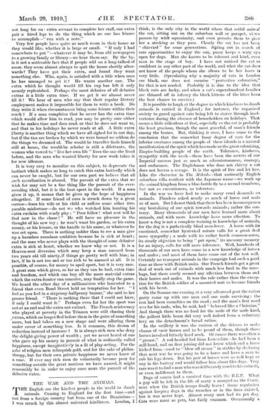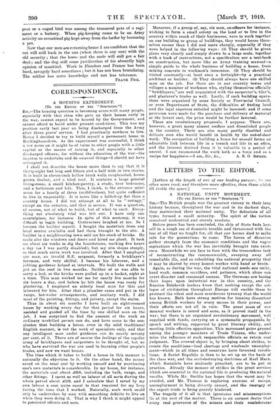THE WAR AND THE ANIMALS.
THE English are the kindest people in the world to dumb animals. Coming to England for the first time—and not from a foreign country but from one of the Dominions— I was struck by this almost universal kindliness. London, I think, is the only city in the world where that artful auireal the cat, sitting out on the suburban wall or parapet, vi'ws passere-by with equanimity, and even permits them to give her a stroking as they pass. Clearly the eat has not been " chivvied " for some generations. Sifting out in search of rare opportunities to enjoy the sun, pussy keeps a wary rya open for dogs. Man she knows to be tolerant and kind, eves man in the stage of boy. I have not noticed the cat so confident in any other part of the world, and what the eat does not know of the people whom she allows to be her hosts is very little. (Speculating why a majority of cats in London are black, one does not surmise "protective coloration," for that is not needed. Probably it ix due to the idea that black cats are lucky, and when a cat's superabundant families are thinned off in infancy the black kittens of the litter have the best chance to survive.) It is possible to laugh at the degree to which kindness to dumb animals is carried in England ; for instance, the organized society to guard against cats being left to starve through Mad. vertenee during the absence of householders on holidays. That seems a little ridiculous at first, especially as the cat is probably the least gracious, though the most graceful, of man's friends among the brutes. But, thinking it over, I have count to the conclusion that the somewhat fussy degree of care for the inferior creatures among the people of these islands is a natural manifestation of the spirit which has made us the great colonizing, Empire-building people of the earth. Toleranee, kindness, sympathy with the weak—these have been the secrets of one Imperial laleCTSA just as much as adventurousness, courage, and endurance. The Englishman who does not chivvy a eat does not harass a savage. It is the spirit of live and let live. Like the character in The Mando—that eminently English suburban villa resident with the Japanese name—wo work up the animal kingdom from a blue-bottle fly to a second trombone, but not as executioners, as tolerators.
In the war we hare had to make many cruel demands on animals. Flanders asked nearly as much of horse and mule as of man. But I do not think that there has been in consequence any brutalizing of our spirit towards animals ; rather the con- trary,. Many thousands of our men hare learned more about animals, and with more knowledge have more affection. Tu know a dog is not a complete training in knowledge of animals, for the dog is a pathetically blind man-lover. A horse with its emotional, somewhat hysterical nature calls for a great deal more sympathy ; a mule with its rather harsh common-sense, its steady objection to being " put upon," its uncanny memory for an injury, calls for still more tolerance. Well, hundreds of thousands of our men have come to a new knowledge of horses
and mules; and most of them have come out of the test well. Certainly no transport animals in the campaign had ouch a good time as those with British units. Our French friends got a great deal of work out of raiimals with much less food in the nose- bags, but there rarely- seemed any affection between them and their horses and mules. It was the rule rather than the excep- tion for the British soldier of a mounted unit to become friends with his beast.
On the Somme one evening at a very advanced post the ration party came up with one man and one mule surviving ; the rest had been casualties on the road ; and the man's first word was for his mule, who, lM said, had " behaved like a Christian." And though there was no food for the mule of the mule kind, the gallant little beast did very well indeed from a voluntary levy on the detachment's bread ration.
In the 'artillery it was the custom of the drivers to make chums of n heir horses and to be proud of them, though those
horses involved bitterly hard work. Of course there was often a "grouse." A red-headed lad from Lancashire—ho had been a mill-hand, and on first joining did nut know which end a 1101A0
kicked from—used to " blow off steam " in stables by declaring that next war he was going to be a horse and have a man to rub his legs down. But his pair of horses were as well kept as any M the battery• and would follow him about like doge. Very rare was it to find a man who was deliberately cruel to his animals, or even indifferent to them.
Dogs of course had a carnival time with the RE.F. What a gap will be left in the life of many a mongrel on the Conti- nent when the British troops finally leave! Sonic. regulation against keepina dogs in the trenches or in the linos existed. but it was never kept. Almost every unit had its pet dog. Cate were rarer as pets, but fairly common. Occasionally
goat or a ringed bird was among the treasured pots of a regi- ment or a battery. When pig-keeping came to be an Army activity an occasional pig kept away from the larder by becoming a pet.
Now that our men are returning home I am confident that the eat will still bask in the sun (when there is any sun) with the old security ; that the horse and the mule will still get a fair deal ; and the dog still some justification of his absurdly high opinion of mankind. Work in Flanders and Franco has been hard, savagely hard sometimes ; but it has not been brutalizing. The soldier has more knowledge and not less tolerance.
FERN% Fox.



































 Previous page
Previous page